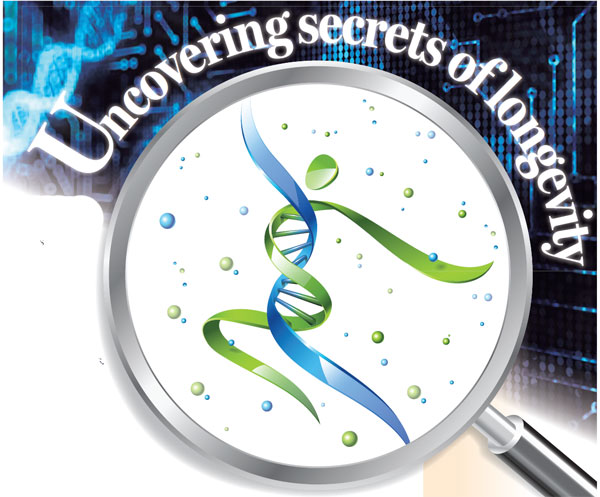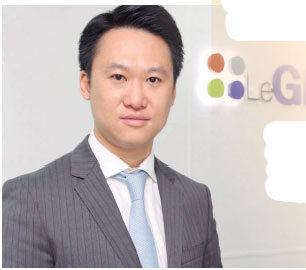Uncovering secrets of longevity
Updated: 2016-02-17 08:22
By Frannie Guan(HK Edition)
|
|||||||||
With the mapping of the human genome, scientists are discovering new ways of extending the normal lifespan. One is an integrated discipline known as precision medicine. Frannie Guan reports.
Scientists at the University of Hong Kong (HKU) believe they have found answers that promise to reduce the toll from one of the city's deadliest afflictions - coronary artery disease. The prescription is "precision medicine", a revolutionary approach that assesses genetics, environmental factors and lifestyle of every patient.
Eleven people die of coronary artery disease every day in Hong Kong. In 2013, the last year for which statistics are available, 4,007 people died from the disease that traces its origins to fatty accumulations on the inner walls of the arteries. Coronary artery disease is the cause of nearly one of every 10 deaths (9.2%) in the city, ranking as the third most common cause.
When fatty deposits, known as blood lipids, reach the critical stage, they start to restrict the flow of oxygen-rich blood to the heart. Blood lipids are the major risk factor for heart disease, says Tse Hung-fat, who led the research team that made the latest breakthrough at Li Ka Shing Faculty of Medicine of HKU. The majority of blood lipids in the human body are manufactured by the liver, he explained. High blood lipid levels are a heritable characteristic, determined by the genes.
Genetic factors, he went on, weigh heavily in identifying who is at risk for coronary artery disease. Most available genetic templates however come from studies done in the West. Chinese people have a different genetic makeup.
Gary Mak Yiu-kwong, director of Pro-Cardio Heart Disease & Stroke Prevention Centre, added that the HKU studies identified three genes unique to Chinese people, which correlate with blood lipid levels. The findings open the way to earlier diagnosis of risks for disease through DNA analysis. That is also leading the way for efforts to help remedy the risk factors, taking into account all three factors that may heighten the risks, based on genetics, environment and lifestyle.
"In the near future, geneticists will be like fortune tellers, but in a scientific way," said Kwok Yuk-lung, medical director of LeGENE genetic center. He believes identifying a patient's predisposition to certain illnesses, based on genetic information, is an important first step for doctors in prescribing the best preventive treatment at the ideal time. Kwok is a respiratory physician. Before establishing LeGENE, Kwok worked as an associate consultant at the Hong Kong Hospital Authority.
Kwok said people may learn their own risk factors for diseases such as diabetes or cancers, by giving blood or saliva samples for testing. Within six to eight weeks, doctors can tell them if they have gene abnormalities.
DNA is a molecule made up of two strands twisted around each other in a double helix. Each strand is made up of a sequence of four chemical bases represented by the letters A, C, G and T (adenine, cytosine, guanine and thymine).
The two strands are complementary, meaning that wherever T is found in one strand, A will be found in the opposite strand. When there's a C in one strand, there will be a G in the other.
Each gene, comprising DNA, is part of a thread like genome, which in turn makes up the 46 chromosomes in the human body. According to Sham Pak-chung, director of the Centre for Genomic Sciences at Li Ka Shing Faculty of Medicine at HKU, the current estimate of the number of human genes is around 25,000 to 30,000.
Predisposition to specific health conditions arises from variations in the normal sequencing of genetic DNA.
Telling signs
Chan Wai-yee, director of the School of Biomedical Sciences at the Chinese University of Hong Kong, said scientists have found that patients diagnosed with specific diseases, have similar genetic coding. Therefore similar coding found in the gene bases of individuals who are apparently healthy, will identify whether they are genetically predisposed to those diseases later in life.
Kwok takes one patient's file as an example. At a point on one gene located on the twelfth chromosome, the patient has an abnormal AA variation. Kwok explains that this patient has a high risk for lung cancer - almost double the rate for those with the normal CG bases.
People found at high risk of developing stomach cancer based on their genetic profile are at even greater risk, if further examination reveals a high concentration in the gut, of the bacterium Helicobacter pylori. The bacterium in combination with genetic predisposition increases the risk of stomach cancer by a factor of 1.5 over the norm. "So they need to have a gastroscope to see if they have the bacterium. If yes, they will need to eliminate them all," said Kwok.
Chan explained, if DNA analysis reveals predisposition to certain diseases, it may also point to the most efficacious medications for reducing risk for that particular patient.
Patients at risk for specific diseases also may be guided to changing their lifestyle, including diet, exercise regimen, and avoiding activities likely to increase susceptibility. Environmental risk factors for specific ailment are also examined, to determine whether elements found at home or in the workplace are likely to exacerbate susceptibility.
"It is this interaction of your genes, lifestyle, and environment that ultimately determines your risks," said Chan.

At the beginning of 2015, US president Barrack Obama announced a Precision Medicine Initiative, aiming to revolutionize the way doctors treat diseases and improve health. The initiative was allocated a $215 million funding in his 2016 Budget.
Hong Kong lags in this area of research but Chan expressed confidence that in the near future, a quick genome analysis will become standard medical practice. Eventually, he said, governments may go further by carrying out genome sequencing for every newborn. He does, however, have some reservations.
"If a patient wants to see if he is predisposed to disease A, and the doctor discovers the patient is prone to disease B. The big question is whether the doctor reveal this to the patient," said Chan. His concern is about patients diagnosed with incurable conditions. Among Chan's research interest is Huntington's disease. A diagnosis of Huntington's is a death sentence for the patient. There is no known cure. Still, the patient may live for several years. Patients with Huntington's, a neurodegenerative disease, typically die in their forties.
With the development of technology, the day will come when a quick analysis of the genome will become routine. Before that time however, many scientific and ethical issues must be resolved.
Contact the writer at frannie@chinadailyhk.com

|
Kwok Yuk-lung, medical director of LeGENE, believes genetic tests should be packaged with adequate counseling before and after the tests so that patients know how to deal with the test results properly. Provided To China Daily |
(HK Edition 02/17/2016 page10)
